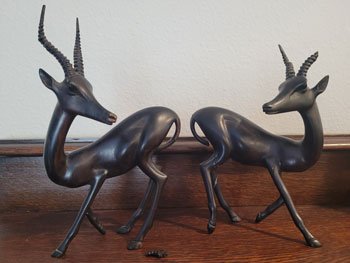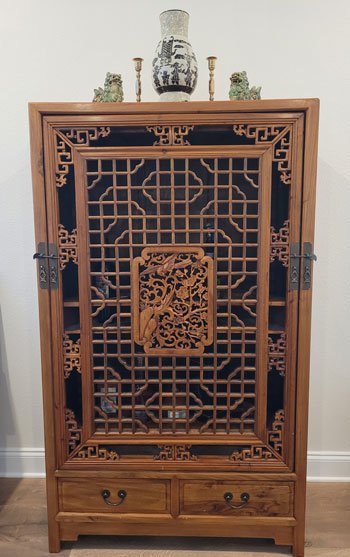After Years of Nomadic Military Life, Permanence Can Be Frightening
This time, I don’t wrap the picture frames, vases, and other delicate souvenirs in bubble wrap, or place them in Tetris-like defensive positions inside a large brown box.
I don’t need to; the boxes aren’t going far.
After years of going where the Air Force tells us, we’re moving into our forever home just down the street. Such permanence feels like a foreign concept, and I marvel at how different this change is from the rest—the half-dozen locations these treasures have traveled, sometimes across the ocean.
They’ve lost friends along the way. Shattered glass and broken frames, dents and scratches, pieces missing in action, disappeared altogether. Battle-worn, like us.

These two hand-carved gazelles from Africa have held on through half a dozen moves—with the help of superglue. Photo courtesy of the author.
In each hand, I weigh two delicate onyx gazelles, hand-carved in Africa, a gift following my husband’s third (or was it the fourth?) deployment. The gazelles have held on during our nomadic lifestyle—barely, and with the help of super glue, and I feel certain they would not survive another major move.
Put me in a stable place and leave me! they seem to beg, and I understand. My children have often made the same pleas. “Why do we have to move again? It feels like we just got here. I don’t want to start all over. I’m going to miss my friends!”
It feels as if we’ve glued together the pieces of their broken hearts just as often, leaving behind hairline scars that you have to squint to see.
* * *
The touch lamp wasn’t really anything special, but I finished my college degree beneath its warm glow. A small, black-and-gold fixture with a simple, classic design, I’d lightly touch its base and adjust the brightness depending on my mood. The lamp was my favorite study partner, resting reliably on my bedside table.

Jessica Morse and her husband just after they started dating in 2005. She hadn’t planned on becoming an Air Force spouse, but after their marriage in 2007, she found herself in the chaos of brown boxes and tan packing paper. Photo courtesy of the author.
And then, it was gone. Vanished somewhere between Texas and England.
When I unpacked the last box in our little English house and failed to find it, I was unmoored. That lamp knew me—as a student, a young wife, a fledgling author, an eager teacher. It had illuminated the words detailing my hopes and dreams for the future.
Now I was alone in a house across the ocean with no job, no plans, no lamp, and it felt as if a piece of me had been lost, too. My identity as an Air Force spouse was something I hadn’t planned for or predicted, and I was consumed by my husband’s chaotic schedule. I struggled to find myself in the chaos of brown boxes and tan packing paper.
* * *
The phone rings, returning me to my current predicament of packing. But it’s a call I’ve been waiting for. The man on the other end tells me he has good news—he can repair our Japanese wine hutch.

Jessica Morse purchased this Japanese wine hutch to celebrate her husband’s graduation and her new job, and she was devastated to find it in two pieces following a move. Photo courtesy of the author.
It will cost a small fortune, far more than the military allotted to repair the damage caused by another set of movers, but it’s worth it. I’d bought it on a whim to celebrate the end of my husband’s most recent six-month temporary duty travel and earning his master’s degree.
The ornately carved piece of furniture caught my eye at an auction with a friend—its warm, honey-colored wood with an eagle at the center. It was perfect. I grabbed a paddle and registered, then waited patiently for my piece to enter its time in the auction.
I shot my paddle up at first bid, and so did several others. As the price rose, fewer paddles went into the air, but I held onto mine, waiting for the right moment to place a final bid. Finally, I thrust my hand into the air.
“Going once, going twice … SOLD!” the auctioneer shouted.
Success felt sweet, and pride filled my chest as I paid for the beautiful hutch with the money I’d earned from a side job. My husband and I were working together to achieve our goals and build a home together.
Award-Winning Journalism in Your Inbox
Then, during our second to last move, I’d found it broken inside a shipping crate.
My husband and I have learned to repair and rebuild. This is my mantra: “What is broken can be mended. What hurts can be healed. And no matter how hard it gets, the sun will rise again.”
* * *
There is something about a brand-new, never-lived-in house. After our belongings are delivered, we began to unpack in this space that is truly ours. We bring out wedding china that has spent the last 17 years in storage, waiting for its time to be useful. My husband’s prized elk mount which has sat idly at his parents’ house during half a dozen moves is now in our possession.
I unpack the beautiful Costa Rican vase from our honeymoon and marvel that the glass has persevered through seven moves. It is, I think, a symbol of our marriage—enduring and unbroken.
For the first time, our belongings are under one roof.

Jessica Morse and her husband stand in front of their first permanent home. Photo courtesy of the author.
Yet as I sit in the living room, I feel that I am not quite home. I feel frozen; I am indecisive about what pictures to hang where and which color to paint the walls. Permanence, it turns out, can be frightening.
The decisions we make in this house will stay with us for years—maybe even decades. It is the stability our children need and have longed for, yet it is more difficult than I imagined to stand, at last, in one place.
But I feel full, too—of the memories we’ve made and the goals we’ve accomplished, of the broken things we’ve pieced back together.
Award-Winning Journalism in Your Inbox
I take a deep breath and hand my husband his tools, showing him where to hang the antique Sicilian map bought during his year-long deployment.
When he’s finished, we stand back to admire the relic in its new place on a new wall.
We smile, stepping into a new adventure and making ourselves at home at long last.
This War Horse reflection was written by Jessica Morse, edited by Kristin Davis, fact-checked by Jess Rohan, and copy-edited by Mitchell Hansen-Dewar. Abbie Bennett wrote the headlines.





Comments are closed.